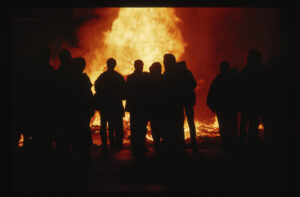At the end of a winding country lane on the shores of Lough Allen in County Leitrim sits a beautiful little cemetery, seemingly all alone in the world. I discovered it while looking for the resting place of my grandad’s long-lost father; a man he’d never known and about whom we still know little. My grandad was raised in a Catholic orphanage in Liverpool. His mother had moved to England sometime before he was born, desperately tried to keep in touch but eventually lost contact after going into service. Such was the world that was.
The cemetery is all that is left of my connection to Leitrim — that and my surname. In this tiny patch of Ireland, far from home, lie various McTigues and McTeigeus, the ancestors who may have given us our name. But that link has been frayed in the churn of emigration and divorce, remarriage and death. Today, the banal truth is that I’m English, not Irish. All my immediate family were born in England. Everything I know and feel has been shaped in England. Like Joe Biden, my closest connection to Ireland is three generations ago. And yet, I’m English and he, as he claims, is Irish.
But don’t just take his word for it. Before the US President arrived in Dublin, the Taoiseach, Leo Varadkar, said how honoured he was to be welcoming Joe Biden “home” to Ireland; fifth cousins lined up to celebrate this homecoming; over the next few days, every sinew in the Republic will be strained to affirm the President’s Irishness. And why not? Not only is it wise to claim the most powerful man in the world as one of your own, doesn’t it make sense to greenwash those US corporate profits sloshing through Ireland?
Not that Biden is faking it. The President’s grandfather, Ambrose — whose father came to America from from Ireland in the 1850s — drummed it into the young Joe Jnr that he should remember “the best drop of blood in you is Irish”. The worst, you see, was English, which had dripped down through the generations on his father’s side. In his speech in Belfast yesterday, Biden even joked about this somewhat embarrassing revelation.
Just as nations are no more than “imagined communities”, so too are diasporas. What is important is not the purity of Biden’s bloodline — a horrible, fascistic idea — but the strength of belief in the idea of Irish-Americanness. If enough people believe they are Irish-American, then Irish America exists not only in theory but in practice — a living reality with its own power that must be reckoned with in Belfast and London. Irish America votes and feels, and therefore has to be taken seriously. In the Seventies and Eighties, it funded the IRA. Today, it warns Britain there will be no trade deal should it abandon the Northern Irish Protocol.
The real potency of the idea of Irish America is that it shapes not only how America sees Ireland but also how Ireland sees itself. “Biden comes with a vision of Irishness which is really an Irish American vision,” Kieran Cuddihy, an Irish radio presenter, told me. “It is quaint and twee — all comely maidens dancing at the crossroads.”
When this caricature is ridiculed, though, the Irish bristle, as happened recently on Saturday Night Live, when two presenters pretended to be Colin Farrell and Brendan Gleeson on the Oscar’s red carpet. The pair spoke in unintelligible accents to the bafflement of their interviewers, who quipped: “Wow, and they haven’t even started drinking yet!” Farrell, who has been sober for years, later criticised the skit, as did the Irish government. And yet, the film for which Farrell was nominated has been slated for playing on these very same stereotypes. How’s that for meta?
The Irish, Cuddihy explains, are happy to indulge that stereotype — but only when it suits them. “We won’t challenge it when Biden’s here,” he says. “In fact, we will lean into it.” As if to prove a point, the teetotal Biden was taken to a pub on the first night of his visit. And Biden plays up to it, describing himself as “the only Irishman you’ve ever met who’s never had a drink”. He has even joked:“I may be Irish but I’m not stupid.”
Hayek observed that tradition was not something constant, “but the product of a process of selection guided not by reason but by success”. So it is with Irishness. The Irishness on offer today works; it is successful. In August, tens of thousands of Americans will fly over to watch “the fighting Irish” of Notre Dame play a College football game in Dublin. As Cuddihy puts it, you can’t put on such a display of Irish-Americana and then tell them their version of Irishness is all wrong. The same is true of the St Patrick’s Day parade in Dublin, now more of an American tribute than an “authentic” celebration.
And yet, much as this version of Irishness is successful for both Irish-American presidents and Ireland itself, there are costs to accommodating such unsubtle caricature. There is another Ireland that does not sit easily with Irish America, just as there is another Irish America that does not sit so easily in Ireland. And that is the one that originated in and is now largely confined to Northern Ireland.
By some estimates, more Irish Americans in the US are now Protestant than Catholic. This is partly because the descendants of Catholic Irish-Americans have since converted — such as the former Vice President Mike Pence, who became an Evangelical to his mother’s distress. For millions of others, though, it is ancestral, their roots reaching back not to a lost Ireland and the trauma of the famine, but to Ulster and a fierce Protestant individualism. It is one of the great ironies of this strange trans-Atlantic relationship, in fact, that in the most hardline of “loyalist” communities in Northern Ireland, murals still depict “Scotch-Irish” American founding fathers such as George Washington, perhaps the most famously disloyal subject in British history.
Biden cleverly nodded towards this heritage in his speech yesterday. “The pride in those Ulster Scots immigrants… who helped found and build my country, they run very deep.” His words were designed to soothe unionist criticism of his own perceived nationalist partisanship. “Men born in Ulster were among those who signed the Declaration of Independence in the United States, pledging their lives, their fortunes, and their sacred honour for freedom’s cause.”
While the Irish America that President Biden embodies has proved resilient, the roots and influence of this other Irish America are just as profound. Back in that beautiful little cemetery in Leitrim there lies one gravestone after another telling the true story of Irish America: of men, woman and children born in Ireland, but spread throughout the world, from New York to London. Each life is its own story. This is the reality of Irish America: a story far more complicated than the one on display over the next few days.
Disclaimer
Some of the posts we share are controversial and we do not necessarily agree with them in the whole extend. Sometimes we agree with the content or part of it but we do not agree with the narration or language. Nevertheless we find them somehow interesting, valuable and/or informative or we share them, because we strongly believe in freedom of speech, free press and journalism. We strongly encourage you to have a critical approach to all the content, do your own research and analysis to build your own opinion.
We would be glad to have your feedback.
Source: UnHerd Read the original article here: https://unherd.com/



